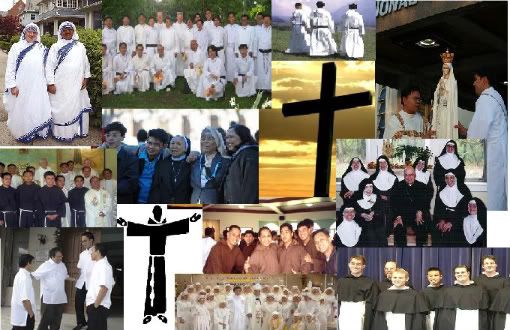St. Francis de Sales writes as follows: “Many enter religion without knowing why they do so. They come into a convent parlour, they see nuns with calm faces, full of cheerfulness, modesty and content, and they say to themselves: ‘What a happy place this is! Let us come to it. The world frowns on us; we do not get what we want there.’ “Others come in order to find peace, consolation and all sorts of sweetness, saying in their minds: ‘How happy religious are! They have got safe away from all their home worries; from their parents’ continual ordering about and fault-finding -- let us enter religion.’ “These reasons are worth nothing. Let us consider whether we have sufficient courage and resolution to crucify and annihilate ourselves, or rather to permit God to do so. You must understand what it is to be a religious. It is to be bound to God by the continual mortification of ourselves, and to live only for Him. Our heart is surrendered always and wholly to His Divine Majesty; our eyes, tongue, hands and all our members serve Him continually. Look well into your heart and see if you have resolution enough to die to yourself and to live only to God. Religion is nothing else than a school of renunciation and self mortification.” As the call to religious life is supernatural, a vocation springing solely from a purely human motive – such as those spoken of by St. Francis – the desire of pleasing one’s parents, or some temporal advantage, would not be to work of grace. However, if the principal motive which inclines us to embrace the religious state is supernatural, the vocation is a true one, for Divine Providence often makes use of the trials and misfortunes of life to fill a soul with disgust for the world and prepare it for a greater grace. St. Romuald, founder of the Camaldolese, to escape the consequences of a duel in which he had taken part, sought an asylum in a monastery, where he was so struck by the happy lives of the monks that he consecrated himself to God. St. Paul, the first hermit, fled to the desert to avoid persecution, and found in the solitude a peace and joy he had sought in vain. How many eyes have been rudely opened to the shortness and uncertainly of life by the sudden death of a dear friend, and made to realize that the gaining of life eternal was “the one thing necessary”; thwarted ambition, the failure of cherished hopes or the disappointment of a loving heart, have convinced many a future saint that the only Master worth serving is Jesus Christ, His affection the only love worth striving for. Hence we may conclude with the learned theologian, Lessius, “If anyone takes the determination of entering religion, well resolved to observe its laws and duties, there is no doubt that his resolution, this vocation, comes from God, whatever the circumstances which seem to have produced it.” “It matters little how we commence, provided we are determined to persevere and end well,” says St. Francis de Sales; and St. Thomas lays it down that “no matter from what source our resolution comes of entering religion, it is from God”; while Suarez maintains that “generally the desire for religious life is from the Holy Ghost, and we ought to receive it as such.”
skip to main |
skip to sidebar

CAPUCHINO.
FRANCISCANO.
PILIPINO.
The Capuchin Friars Minor is a religious community of Priests and Brothers living in Gospel Brotherhood, Prayer and Contemplation, Minority, Simplicity and Joy! If you are at least 18 years old and at least a second year college/vocational student,
WE INVITE YOU TO JOIN US!
Board and lodging and tuition scholarships are offered to all accepted applicants.
CAPUCHIN VOCATION OFFICE
Sta Teresita del Nino Jesus Parish
43 Kanlaon St., Sta. Mesa Heights, Quezon City
(02) 731 5044, (02) 731 9227, 0917 815 8133
bokasyongcapuchino@gmail.com
capvoc@yahoo.com.ph
Archives
- vocation resources (19)
- vocation videos (3)
- religious orders (men) (2)
- vocation (2)
- definition of terms (1)
- franciscan family (1)
- information (1)
- message (1)
- pope (1)
- prayer (1)
- religious formation (1)
- world (1)
WHAT'S YOUR CALLING?
"You have not chosen me: but I have chosen you; and have appointed you, that you should go, and should bring forth fruit; and your fruit should remain."
(John 15:16)
(John 15:16)
Prayer to Follow Christ's Call
Lord, I thank you for the gifts you have given me, especially for life, love, family and friends. Help me to know myself better and my talents. As I pray, study and decide on my life's work, help me see and understand the path you open for me. Help me choose a life's work, which will be in response to my potential and your love. If I am invited to follow you as a Priest, a Monk or Nun, a Religious Brother or Sister, Missionary or Lay Consecrated, give me a generous heart to respond to your challenging call ang the strength to follow You whatever you lead me.
AMEN!
(Adopted from the Daugthers of Divine Zeal Philippine Delegation)
AMEN!
(Adopted from the Daugthers of Divine Zeal Philippine Delegation)
CBCP News
Catholic World News
BUHAY CAPUCHINO!

CAPUCHINO.
FRANCISCANO.
PILIPINO.
The Capuchin Friars Minor is a religious community of Priests and Brothers living in Gospel Brotherhood, Prayer and Contemplation, Minority, Simplicity and Joy! If you are at least 18 years old and at least a second year college/vocational student,
WE INVITE YOU TO JOIN US!
Board and lodging and tuition scholarships are offered to all accepted applicants.
CAPUCHIN VOCATION OFFICE
Sta Teresita del Nino Jesus Parish
43 Kanlaon St., Sta. Mesa Heights, Quezon City
(02) 731 5044, (02) 731 9227, 0917 815 8133
bokasyongcapuchino@gmail.com
capvoc@yahoo.com.ph







